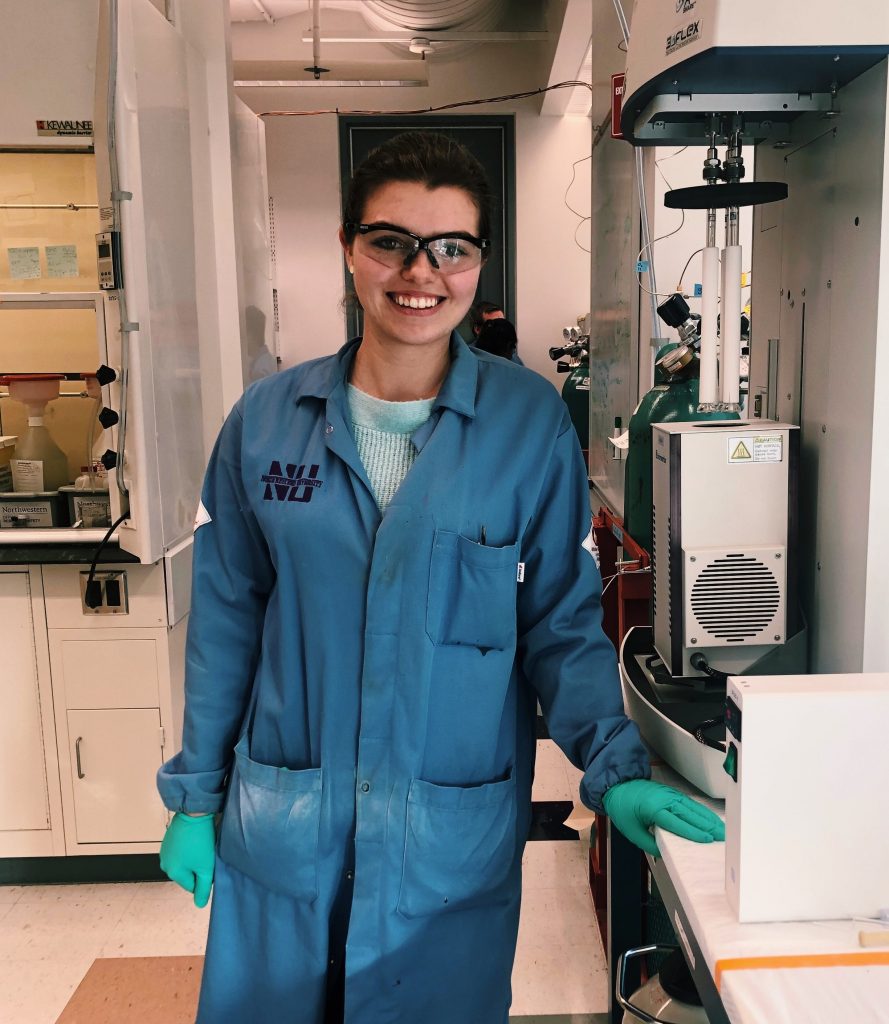Nanotechnology at Northwestern
Meet Megan Wasson, a PhD student in Omar Farha’s group
January 07, 2020
Megan Wasson is a third-year Ph.D. candidate in the Farha Group. She was born and raised in Pittsburgh, PA, and completed her undergraduate degree there at Duquesne University.
When did you first become interested in chemistry?
I was fortunate to have remarkable chemistry teachers during middle and high school, and chemistry became one of my favorite subjects. I decided to pursue chemistry as an undergraduate and conducted research on copper-based catalysis. Undergraduate research inspired me to go to graduate school, but I wanted to work in a highly interdisciplinary field such as nanotechnology. During my senior year inorganic chemistry class, I briefly learned about hybrid nanomaterials called metal–organic frameworks (MOFs). I was intrigued with how subtle changes at the molecular level could result in vastly different properties throughout the bulk, uniform material. Upon coming to Northwestern, I joined Omar Farha’s lab, which investigates MOFs for numerous applications by combining knowledge from a variety of fields to answer questions at the forefront of nanotechnology.
How do you explain what you study to non-scientists?
The Farha group has made tremendous discoveries in the design of sophisticated MOF nanomaterials, which are built from simple metal clusters linked through carbon-based spacing groups. These building blocks assemble into multi-dimensions to form well-defined structures with very high surface areas. My work involves making precise, metallic nanoclusters, which can be studied as independent materials or as installed parts of MOFs. These discrete nanoclusters are catalysts, chemical species that speed up chemical reactions by promoting a pathway that requires less energy to obtain a desired molecule.
Can you tell me about some potential applications for your work?
Catalysts are used to make commodities like high-quality plastics, gasoline, and fertilizers that we use, either directly or indirectly, every day. The nanoclusters I synthesize are uniform and well-defined catalysts, which means that we can pinpoint any observed changes in chemical reactivity to the slight molecular differences between clusters. The trends we uncover from studying these metallic clusters will inform the design of industrial catalysts with higher performance and selectivity, leading to more environmentally friendly processes.
Where do you hope to be with your career in five years?
I would love to work at a materials-based startup company or venture into a more nontraditional pathway, such as management consulting or science policy. In any capacity, I hope the work I’m pursuing is impactful and affords opportunities to engage with the greater public.
Can you tell me about your experiences either being mentored or mentoring others here at Northwestern?
For any researcher at Northwestern, you have nearly every scientific instrument and resource available at your fingertips. However, it’s the people at Northwestern that are an invaluable asset to the university’s research. Core facility scientists help us answer some really difficult questions while simultaneously educating us on the techniques used. Within the Farha group, there is a strong sense of mentorship beyond that of understanding the science alone. For example, the older graduate students have led workshops for new students on how to effectively give scientific presentations and write fellowship applications. Beyond peer mentorship, I have greatly benefitted from and appreciated Omar’s advisement; he has challenged me with interesting questions to pursue while also giving me the independence to tackle my own ideas. He is an incredible advocate for his students, always looking for opportunities and experiences that will benefit us. I had the opportunity to mentor an extremely talented undergraduate this past summer, and it was a rewarding experience to see her progress and develop her own insights.
What’s the best part about being a student in the Farha group?
Our group is comprised of undergraduates, graduate students, post-docs, visiting scholars, and research associates who all bring a variety of skillsets and personalities. I have found that there is always someone in the lab who can answer my questions, and everyone is willing to help each other. We also have a great network of collaborators that we work with if we need help with a specific topic. Omar has done an excellent job of creating this collaborative and supportive environment. Beyond discussing science, he is a great person to receive general advice from because he genuinely cares about his team.
The group dynamic makes work fun; we have been known to sing loudly inside the lab while we’re working – apologies to anyone who can hear our off-key voices. Our group gatherings typically involve competitive games ranging from bowling to beach volleyball- which is entertaining to say the least. A word of advice: keep track of your score if you ever play against Omar, he has a tendency to try to change it!
What are your hobbies outside of the lab?
In my free-time, I enjoy staying active, especially by playing tennis and platform tennis. Truthfully, I spend a lot of time exercising because another favorite pastime of mine is exploring new restaurants in the Chicago area.
